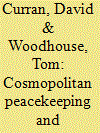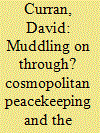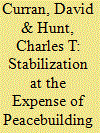|
|
|
Sort Order |
|
|
|
Items / Page
|
|
|
|
|
|
|
| Srl | Item |
| 1 |
ID:
079882


|
|
|
|
|
| Publication |
2007.
|
| Summary/Abstract |
The article is organized into two main parts. First, it presents the termination of the conflict in Sierra Leone as a case-study to examine the degree to which cosmopolitan values connecting peacekeeping and peacebuilding are (or are not) evident. The case-study looks at the United Nations Mission in Sierra Leone (UNAMSIL) as a model of successful peacekeeping in the sense that everyday security was provided for the people of Sierra Leone through the deployment of a robust peacekeeping mission. This assessment needs to be qualified in relation to serious deficits still to be addressed in post-conflict peacebuilding, yet the success of this mission does provide encouragement for those who see the construction of a cosmopolitan security architecture for Africa as both desirable and achievable. Second, it explores the degree to which an appropriate model of cosmopolitan peacekeeping might emerge at regional and continental levels in Africa through the development of the African Standby Force (ASF). What the case-study presented here and the survey of the African Union (AU)/ASF in the second part of the article have in common is that taken together, they provide some evidence to suggest that, however fragile, the AU is beginning to define an agenda that represents a continent wide and, in that sense at least, a cosmopolitan response to African security issues
|
|
|
|
|
|
|
|
|
|
|
|
|
|
|
|
| 2 |
ID:
151524


|
|
|
|
|
| Summary/Abstract |
This article analyses direct forms of the ‘protection of civilians’ (PoC) in United Nations (UN) peacekeeping, and how this links to aspirations outlined by cosmopolitan scholarship at the turn of the twentieth century. Its main contention is that cosmopolitan conceptions of peacekeeping, which advocate more active forms of civilian protection, have faced significant challenges in the UN peacekeeping system. These challenges (internal and external) are a result of the state-based nature of the UN, and its peacekeeping practice. Therefore, the UN’s flexibility to adopt ethical practices associated with PoC can only be contained within confined boundaries. The article takes as its starting point the aspirations of cosmopolitan scholarship before outlining policy development in UN peacekeeping concerning PoC. It then explores internal and external challenges faced in operationalizing PoC in UN peacekeeping practice before arguing that the UN may be at a stage where it is ‘muddling through’ in terms of PoC. The article contributes to debates about the role of peacekeeping in global politics, through seeking to understand the possible limits of cosmopolitanism within peacekeeping practice. Moreover, it offers a contemporary understanding of where the UN has developed PoC in its deployments and what challenges remain.
|
|
|
|
|
|
|
|
|
|
|
|
|
|
|
|
| 3 |
ID:
171076


|
|
|
|
|
| Summary/Abstract |
The “uploading” of stabilization to UN peacekeeping presents conceptual, political, and practical challenges to the UN’s role in global governance and international conflict management. While scholarly research on stabilization has generally focused on militarization, its relationship to peacebuilding in the context of UN peacekeeping is underexplored. This article examines that relationship. A survey of UN policy frameworks highlights the simultaneous emergence of stabilization and clear expressions of peacebuilding. The article then draws on fieldwork in Mali and the Democratic Republic of Congo to illustrate how stabilization is displacing peacebuilding in the practices of UN peacekeeping. The article argues that the politics of stabilization impede local forms of peacebuilding, at odds with the “Sustaining Peace” agenda, and risks jeopardizing the lauded conflict resolution potential of UN peacekeeping.
|
|
|
|
|
|
|
|
|
|
|
|
|
|
|
|
| 4 |
ID:
119285


|
|
|
|
|
| Publication |
2013.
|
| Summary/Abstract |
The purpose of this article is to outline developments in UN training programmes in negotiation, and civil military coordination. The article seeks to engage positively with critical assessments of peacekeeping and peacebuilding. It demonstrates that by making military peacekeepers aware of non-violent solutions to potentially violent situations (through negotiation skills for instance), and also of the peacekeeping/peacebuilding nexus (for example through civil-military coordination), there are signs of a deepening understanding of principles of conflict resolution by those who run UN peacekeeping structures.
|
|
|
|
|
|
|
|
|
|
|
|
|
|
|
|
| 5 |
ID:
149277


|
|
|
|
|
| Summary/Abstract |
This article analyses the United Kingdom’s (UK) approach to United Nations (UN) peace operations and whether Britain is prepared politically, bureaucratically, financially, and militarily to increase its contributions to them. The article begins with an overview of UK engagement with UN peacekeeping since 1956 before discussing the political issues that govern British decisions about peacekeeping. The third section then assesses several challenges that would need to be addressed in order for the UK’s increased participation in UN missions to be effective. Finally, the article outlines the main factors pushing the UK towards greater engagement with UN peace operations, including opinions voiced by select domestic, international, and institutional audiences.
|
|
|
|
|
|
|
|
|
|
|
|
|
|
|
|
|
|
|
|
|